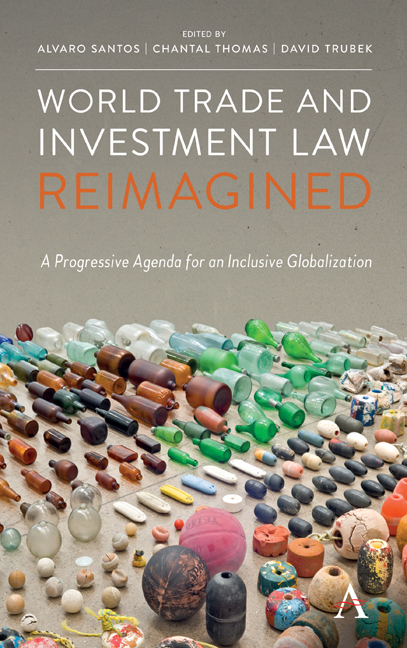Book contents
- Frontmatter
- Contents
- Acknowledgments
- List of Contributors
- Introduction World Trade and Investment Law in a Time of Crisis: Distribution, Development and Social Protection
- PART I RETHINKING THE POLITICAL ECONOMY OF TRADE: COMMENTS ON DANI RODRIK'S STRAIGHT TALK ON TRADE
- Chapter One Comments on Straight Talk on Trade
- Chapter Two Thoughts on Straight Talk on Trade
- Chapter Three Reading Rodrik: A Call for a New Law and Economics for International Law
- Chapter Four Reflecting on Straight Talk on Trade
- Chapter Five A Response to the Comments by Thomas, Gallagher, Shaffer and Santos
- PART II SETTING THE STAGE FOR A PROGRESSIVE VISION: EMERGING ISSUES IN WORLD TRADE AND INVESTMENT LAW
- SECTION 1 MAPPING THE NEW CONTEXT FOR TRADE AND INVESTMENT LAW
- SECTION 2 DEALING WITH MAJOR CHANGES IN THE WORLD ECONOMY
- SECTION 3 FRAMING A MORE EQUITABLE INVESTMENT LAW REGIME
- SECTION 4 SUPPORTING DEVELOPMENT
- SECTION 5 REINFORCING SOCIAL PROTECTION: SPREADING THE BENEFITS OF TRADE, DEALING WITH LOSSES AND EXPLORING THE TRADE–IMMIGRATION NEXUS
- Index
Chapter Three - Reading Rodrik: A Call for a New Law and Economics for International Law
from PART I - RETHINKING THE POLITICAL ECONOMY OF TRADE: COMMENTS ON DANI RODRIK'S STRAIGHT TALK ON TRADE
Published online by Cambridge University Press: 07 September 2019
- Frontmatter
- Contents
- Acknowledgments
- List of Contributors
- Introduction World Trade and Investment Law in a Time of Crisis: Distribution, Development and Social Protection
- PART I RETHINKING THE POLITICAL ECONOMY OF TRADE: COMMENTS ON DANI RODRIK'S STRAIGHT TALK ON TRADE
- Chapter One Comments on Straight Talk on Trade
- Chapter Two Thoughts on Straight Talk on Trade
- Chapter Three Reading Rodrik: A Call for a New Law and Economics for International Law
- Chapter Four Reflecting on Straight Talk on Trade
- Chapter Five A Response to the Comments by Thomas, Gallagher, Shaffer and Santos
- PART II SETTING THE STAGE FOR A PROGRESSIVE VISION: EMERGING ISSUES IN WORLD TRADE AND INVESTMENT LAW
- SECTION 1 MAPPING THE NEW CONTEXT FOR TRADE AND INVESTMENT LAW
- SECTION 2 DEALING WITH MAJOR CHANGES IN THE WORLD ECONOMY
- SECTION 3 FRAMING A MORE EQUITABLE INVESTMENT LAW REGIME
- SECTION 4 SUPPORTING DEVELOPMENT
- SECTION 5 REINFORCING SOCIAL PROTECTION: SPREADING THE BENEFITS OF TRADE, DEALING WITH LOSSES AND EXPLORING THE TRADE–IMMIGRATION NEXUS
- Index
Summary
Dani Rodrik's Straight Talk on Trade: Ideas for a Sane World Economy is a model of how to combine theory, empirics and pragmatic and innovative proposals in a sophisticated but accessible way. The result is a series of insights that are important for anyone wishing to develop a progressive agenda for international trade and investment law. In this essay, I highlight five insights that international economic law scholars should take into account as we rethink trade and investment law.
Globalization Has Gone Too Far
Rodrik's core argument is that international trade and economic integration agreements in support of globalization have excessively constrained national policy space. They have done so through a web of multilateral, regional, plurilateral and bilateral trade, investment and economic integration agreements. The World Trade Organization (WTO) lies at the pinnacle of trade governance, but it is just the big meatball in a spaghetti bowl of agreements. The loss of balance between economic globalization and compensating domestic policy became politically salient following the 2008 financial crisis.
International Economic Law Should Respect Democracy and Empower Nation-State Regulation of the Global Economy
Rodrik's diagnosis is that the relation of domestic law and politics, on the one hand, and economic globalization (or “hyperglobalization”), on the other, has become imbalanced. While economies globalize, politics remain local. International economic law, Rodrik argues, needs to empower nation-states to regulate the global economy, not disempower them. Prudence dictates a more modest approach, one in which international law does not aim to restructure states but rather to complement and support their policies under a guiding principle of nondiscrimination.
Rodrik argues that “we need to place the requirements of liberal democracy ahead of those of international trade and investment.” If, despite the gains from trade, economic globalization puts liberal democracy at risk, then we need to readjust the balance in favor of more domestic policy space and less economic integration facilitated by international economic law.
This calls for a law and economics that takes account of social and political context and thus the relation of international law and institutions to the nation-state. One can then adopt pragmatic policies to spur economic growth while maintaining economic stability and cooperative trade relations supported by law, all of which requires a balance of national and international rules and authority.
- Type
- Chapter
- Information
- World Trade and Investment Law ReimaginedA Progressive Agenda for an Inclusive Globalization, pp. 41 - 46Publisher: Anthem PressPrint publication year: 2019



